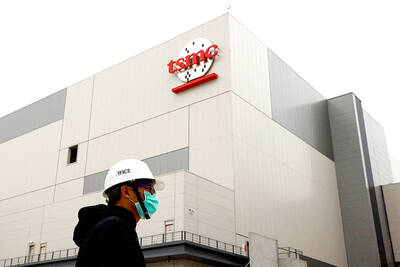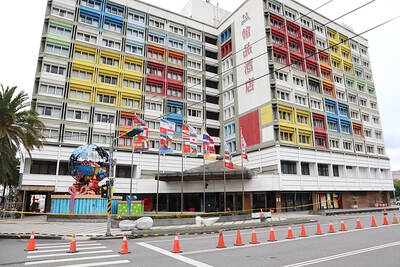SEMICONDUCTORS
TSMC hiring engineers
Taiwan Semiconductor Manufacturing Co (TSMC, 台積電) yesterday said that it has started a recruitment campaign in preparation for a planned wafer fab in the US. It has posted information on LinkedIn about the new openings, mostly for engineers, such as research and development engineers, process integration engineers, module process engineers, module equipment engineers, facility mechanical engineers and equipment automation software engineers, the firm said. TSMC said new hires would initially work in Taipei and some would be dispatched to the wafer fab it plans to build in Arizona.
SHOPPING CENTERS
T.S. Mall to start test run
T.S. Mall (南紡購物中心) yesterday said that it is planning to begin the trial run of its new A2 shopping center in Tainan on Dec. 25. The shopping center has a total business area of about 8,000m2 spread over nine floors above ground and two underground, the company said. The shopping center would focus on catering and entertainment, T.S. Mall said. Together with the existing A1 shopping center, T.S. Mall would become Tainan’s largest shopping mall operator, it said.
SEMICONDUCTORS
GlobalWafers optimistic
GlobalWafers Inc (環球晶圓), the third-largest silicon wafer supplier in the world, yesterday said that the long-term development of semiconductor industry remains promising, despite short-term challenges caused by the COVID-19 pandemic, unfavorable foreign exchange rates and political uncertainties around the world. The firm said its optimism is based on the continued launch of new technology products and policy support by governments for the post-pandemic period. GlobalWafers reported net income of NT$3.39 billion (US$117.22 million) for last quarter, down 0.3 percent quarter-on-quarter, but up 1.8 percent year-on-year. Earnings per share were NT$7.78. In the first three quarters, combined net income fell 9.9 percent from a year earlier to NT$9.67 billion, or earnings per share of NT$22.21.
MACHINERY
Hiwin net income soars
Linear-motion component supplier Hiwin Technologies Co (上銀科技) yesterday reported net income of NT$926 million for last quarter, up 63.4 percent from the previous quarter and the highest in eight quarters, with earnings per share of NT$2.91. The firm’s revenue last quarter grew 4.3 percent from the previous quarter to NT$5.87 billion and operating margin improved by 0.55 percentage points to 28.42 percent. However, operating margin dropped 0.96 percentage points to 11.26 percent due to an increase in operating expenses, the firm said in a filing with the stock exchange. For the first three quarters of this year, combined net income fell 25.4 percent year-on-year to NT$1.36 billion, translating into earnings per share of NT$4.27.
MANUFACTURING
CFTC revenue rises 10%
China Fineblanking Technology Co (CFTC, 和勤精機), a manufacturer of metal stamping products, yesterday reported that revenue last month increased from a year earlier due to a steady recovery in the Chinese auto market. Consolidated revenue grew 10.04 percent to NT$210 million last month, the company said in a statement. Cumulative revenue in the first 10 months expanded 9.65 percent to NT$1.82 billion, it said. As production and sales in China’s auto market grow, and orders from clients continue to rise, it expects revenue for this quarter to be the highest for this year, the company said.

Stephen Garrett, a 27-year-old graduate student, always thought he would study in China, but first the country’s restrictive COVID-19 policies made it nearly impossible and now he has other concerns. The cost is one deterrent, but Garrett is more worried about restrictions on academic freedom and the personal risk of being stranded in China. He is not alone. Only about 700 American students are studying at Chinese universities, down from a peak of nearly 25,000 a decade ago, while there are nearly 300,000 Chinese students at US schools. Some young Americans are discouraged from investing their time in China by what they see

Taiwan Semiconductor Manufacturing Co (TSMC, 台積電), the world’s largest contract chipmaker, yesterday reported record sales for the first quarter, which analysts attributed to solid demand for emerging technologies. Consolidated revenue totaled NT$592.64 billion (US$18.51 billion) in the January-to-March period, up 16.5 percent from a year earlier, but down 5.26 percent from the previous quarter, TSMC said in a statement. The first-quarter revenue beat analysts’ average projection of NT$579.5 billion, Bloomberg News reported. That performance lends weight to expectations that the world’s most valuable chipmaker would return to solid growth this year after weathering a post-COVID-19-pandemic cratering of smartphone and computer sales. TSMC is budgeting

HUALIEN BRANCH: The company had been planning to rebuild the hotel before it was damaged in the quake and vowed to give affected employees the option to transfer The owner of Chateau de Chine Hualien (花蓮翰品酒店) is planning to lay off 86 workers after shutting down the hotel due to damage it sustained in a powerful earthquake on Wednesday last week, the Ministry of Labor said yesterday. The hotel has submitted a layoff report to the Hualien County Government and expects to let 69 workers go this month and 17 next month, the ministry said. LDC Hotels & Resorts Group (雲朗觀光集團), the owner of Chateau de Chine Hualien, confirmed the layoff plan in a statement yesterday. LDC said the hotel has been closed since Wednesday last week when the temblor occurred

US CONSCULTANT: The US Department of Commerce’s Ursula Burns is a rarely seen US government consultant to be put forward to sit on the board, nominated as an independent director Taiwan Semiconductor Manufacturing Co (TSMC, 台積電), the world’s largest contract chipmaker, yesterday nominated 10 candidates for its new board of directors, including Ursula Burns from the US Department of Commerce. It is rare that TSMC has nominated a US government consultant to sit on its board. Burns was nominated as one of seven independent directors. She is vice chair of the department’s Advisory Council on Supply Chain Competitiveness. Burns is to stand for election at TSMC’s annual shareholders’ meeting on June 4 along with the rest of the candidates. TSMC chairman Mark Liu (劉德音) was not on the list after in December last